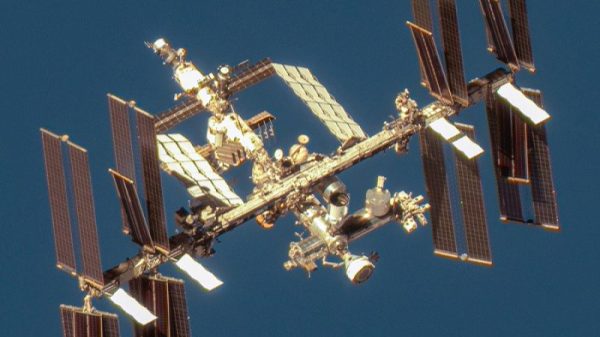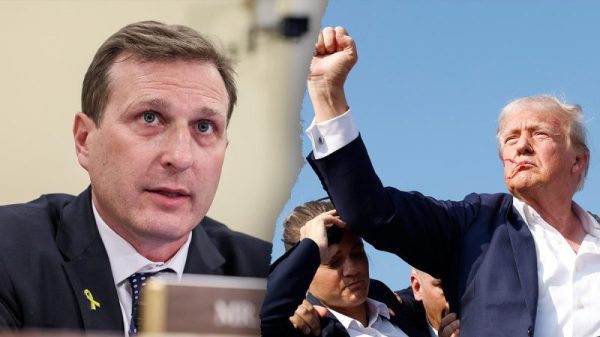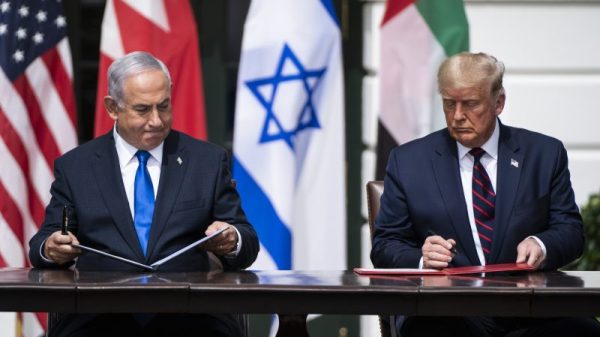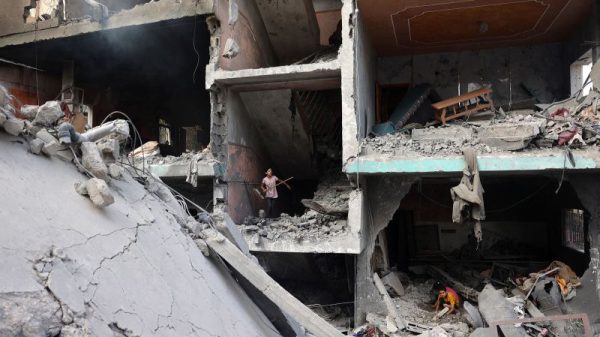The Israeli military is tightening its grip on northern Gaza, as its war on the Hamas militant group is showing no signs of abating.
Almost six weeks into the conflict, however, Israel is yet to offer a clear post-war plan for the territory.
Israeli Defense Minister Yoav Gallant last week said the Israel Defense Forces (IDF) has effectively cut the Strip in two, and on Tuesday claimed Hamas had lost control in northern Gaza, including in Gaza City.
The Israeli military raided Gaza’s largest hospital, Al-Shifa, on Wednesday after claiming that Hamas had built a command center beneath the sprawling medical complex.
On Thursday, the Israeli army released video of what it called an “operational tunnel shaft,” unearthed in the grounds of the hospital. Hamas responded by accusing Israel of giving “false scenarios, fabricated narratives, and distorted information” about Al-Shifa.
But what is Israel’s plan for Gaza if and when it achieves its aim of eliminating Hamas? Some experts say Israel may not have a clear idea.
“They (Israel) would argue they have time to figure that out after the military operation,” Lowenstein said.
Beyond those vague hints, Netanyahu has not provided a defined strategy for the territory, where more than two-thirds of its 2 million inhabitants are now internally displaced, and where more than 40% of all housing units have been either destroyed or damaged, according to United Nations Office for the Coordination of Humanitarian Affairs (OCHA), citing the Ministry of Housing in Gaza.
“Israel went into this without a clear plan for the morning after,” said Daniel Levy, president of the US-Middle East Project, a London and New York-based organization focusing on finding resolutions to the Israel-Palestinian conflict.
What role can Palestinians play?
The PA has a troubled history in Gaza, and was essentially kicked out by Hamas in 2007 after a brief civil war, leaving it with limited authority over parts of the West Bank only. Analysts fail to agree whether bringing it back to the Strip would work.
Kobi Michael, a senior researcher at the Institute for National Security Studies (INSS) in Tel Aviv, said the PA is “not the solution but the problem,” adding it has not run the West Bank efficiently and suffers a “huge deficit of legitimacy in its own constituency.”
The Palestinian Center for Policy and Survey Research in Ramallah found last year that more than 70% of Palestinians were dissatisfied with Mahmoud Abbas, the PA’s ageing president – the poll found 74% demanding he resign.
Levy, of the US-Middle East Project, who is also a former Israeli peace negotiator, said that one of main reasons Abbas has lost popularity is that he has agreed to work with Israel, with Israeli settlements under his rule only expanding deeper into the West Bank.
“The real question may be whether the PA would actually have the will and the capacity to play meaningful role,” Lowenstein said, adding that “they have already made clear they will not take over on the back of Israeli tanks or without a path to an independent state.”
Regional players
Both Palestinians and regional players may be reluctant to accept what Israel has so far suggested, experts say.
Several key regional powers – Egypt, Jordan, Qatar, Saudi Arabia and the United Arab Emirates – have stressed the two-state solution as the only pathway toward peace.
Arab countries are reluctant to accept the issues raised by Netanyahu, said Lina Khatib, head of the SOAS Middle East Institute in London.
That way, she said, the territory would have a government that is “perhaps more legitimate as far as Palestinians are concerned, both in Gaza and the West Bank.”
The PLO was formed in the 1960s and enjoyed a reputation for decades among Palestinians as the legitimate voice of their resistance.
Michael of INSS, who previously served as the head of the Palestinian desk at Israel’s Ministry for Strategic Affairs, said that the Israeli-Palestinian bilateral level of negotiations “has been exhausted,” adding that “the maximum that Israel can give the Palestinians doesn’t meet the minimum that the Palestinians request and vice versa.”
The conflict, he said, must be seen as a regional issue and not just one between Palestinians and Israelis. Regional players must play more significant roles, he said.
Even before the current crisis, Gaza’s near-17 years of blockade has shattered its economy and left 80% of its population reliant on international aid, according to a report by the UN Conference on Trade and Development (UNCTAD). This war has then set the Palestinian economy in both Gaza and the West Bank back decades, said the UN Development Programme (UNDP), without producing an estimate of the costs for Gaza’s reconstruction, given the current uncertainty around the length of Israel’s campaign.
The Palestine Economic Policy Research Institute, however, put that estimate at up to $20 billion over the next five years. It also said that “no single Palestinian party can reconstruct the Gaza Strip after the war, or restore its devastated economy, in the absence of generous international aid.”
Experts have pointed to the UNDP and the UN Relief and Works Agency for Palestine Refugees (UNRWA) as some of the key players that could help distribute aid and reconstruct the territory but have warned that donor countries will not only need to contribute generously, but also that aid groups will need to feel they can operate safely there.
With Israel showing no sign of succumbing to pressure to agree a ceasefire, the conflict risks dragging on, experts say, and an Israeli presence in Gaza is likely to continue for the foreseeable future.
Levy warned that unless the “problem of Palestinian dispossession, statelessness and lack of rights” is addressed, the most likely outcome of the current conflict will be that “Hamas will continue to exist.”
“Its military capacity may be downgraded, (but) politically it is probably stronger than before,” he said. “There will still be a Hamas.”
In terms of a future resolution, Lowenstein said that a lot of work will need to be done if the two-state solution is revived as it was “at best on life support before the conflict,” and “often more of a talking point than a policy.”
“Far-sighted leadership and tough decisions” are needed to change the course of the current conflict, he added, “which is really hard to imagine in the current political climate.”
“But maybe this will eventually make both sides realize there really is no viable alternative,” he added.







































